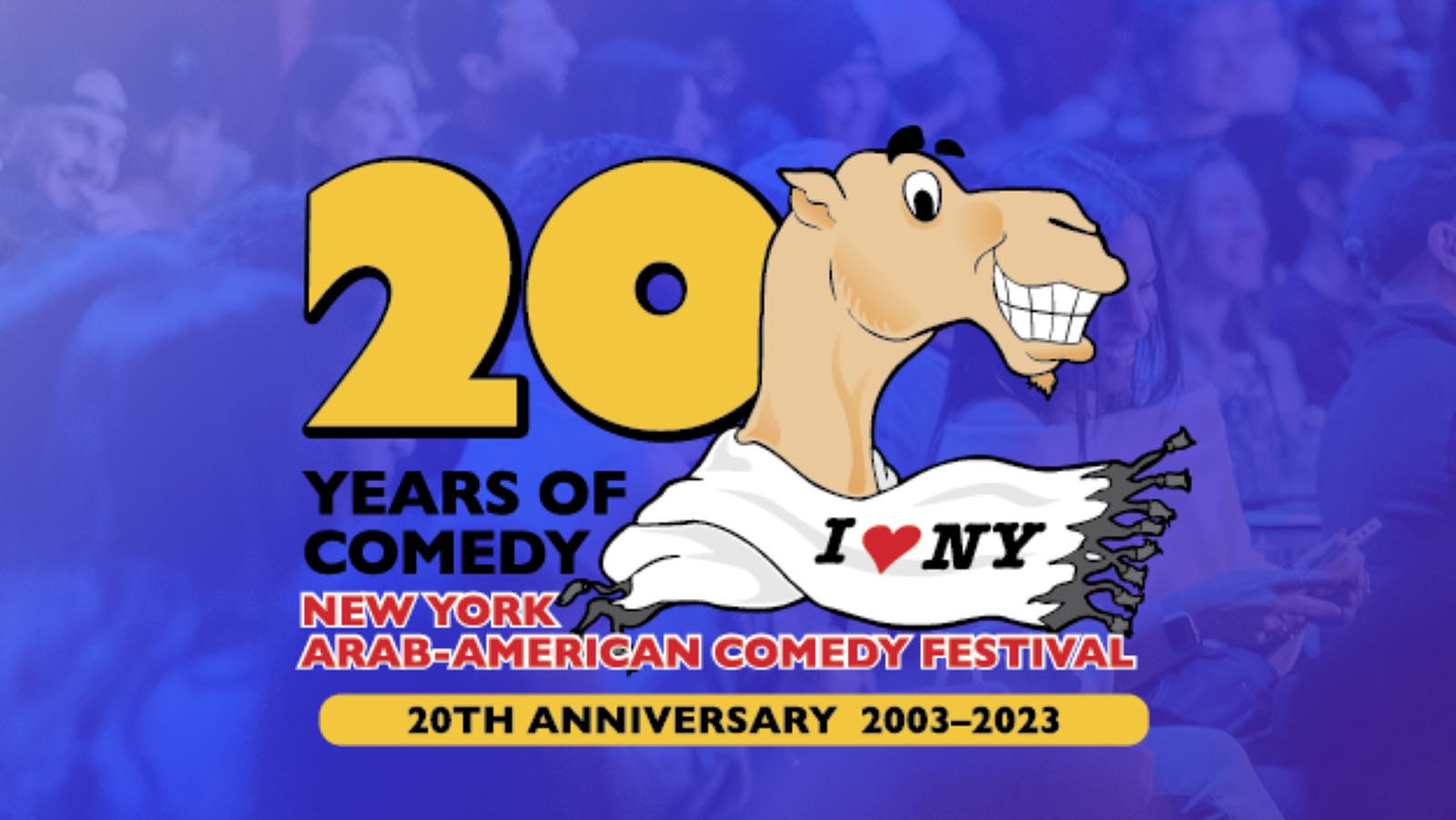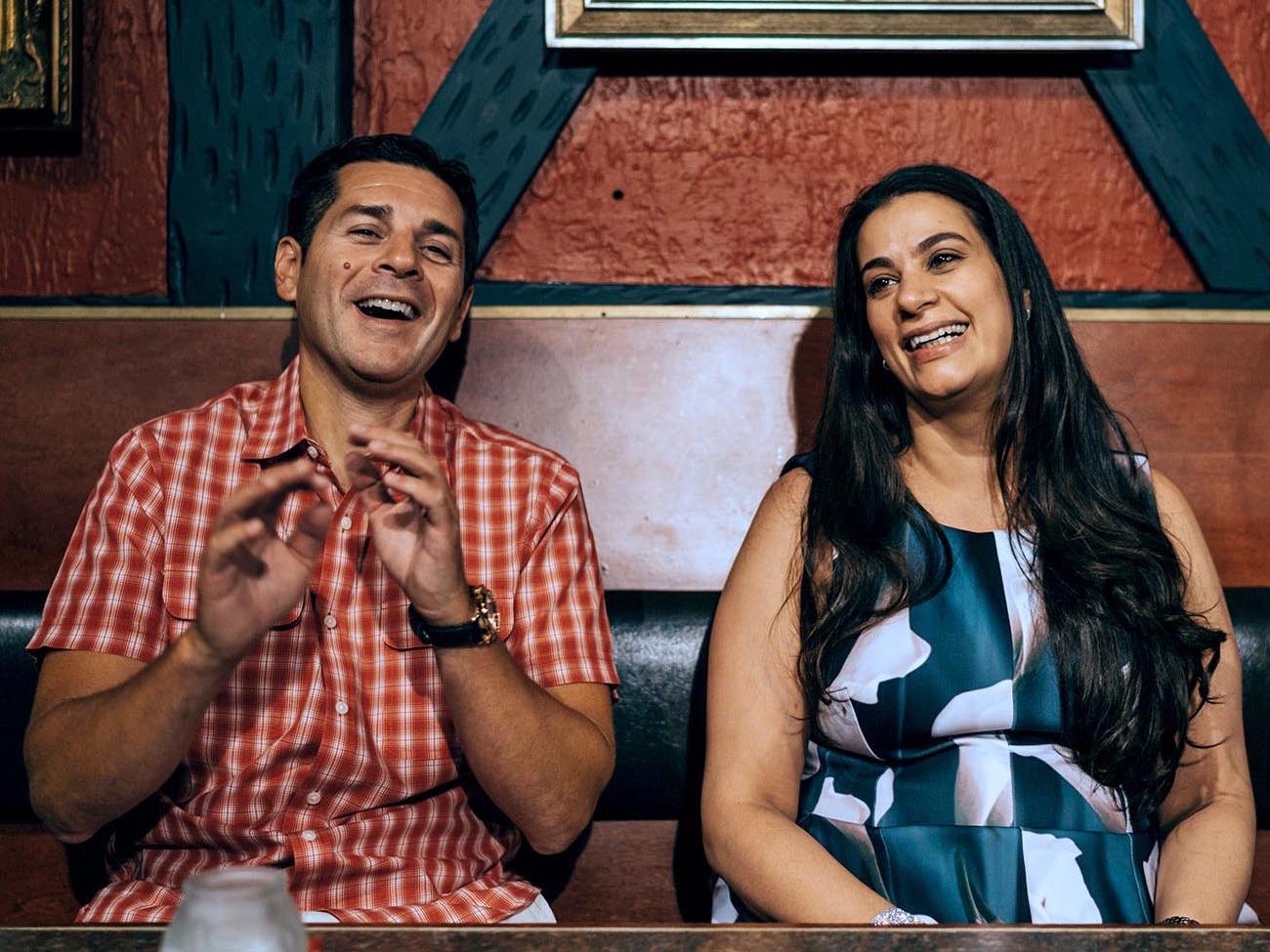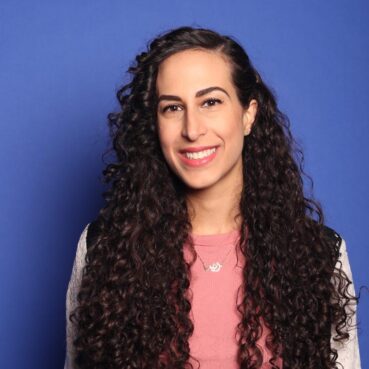
Artwork for the New York Arab American Comedy Festival. Courtesy image
(RNS) — Atheer Yacoub spent her childhood between the occupied territories of the West Bank and the heart of Alabama, a mix that never failed to get a laugh from friends in New York, where she moved in 2008 for graduate school but began taking improvisation and screenwriting classes.
When she tried stand-up, her odd childhood also served as a reliable source of punchlines. “I constantly got asked questions about my weird upbringing, so I started talking about it on stage,” said Yacoub, who riffed in a pre-pandemic set on being asked if she rides a camel or speaks “Islamic.”
In the pitched political battles that broke out over the past decade over Muslim immigrants (and, purportedly, presidents) and the struggles of Palestinians everywhere, Yacoub got her biggest laughs when her jokes went after stereotypes about Arab Americans and Islam, and slyly dismantled them.
This month, Yacoub will be one of the headliners at the Arab American Comedy Festival, a monthslong comedy tour that is celebrating its 20th anniversary.
Founded after 9/11 to counter anti-Muslim hate, the festival is presented by the Doris Duke Foundation’s Building Bridges Program, which aims to counter anti-Muslim hate through storytelling and other media.
“We are trying to show our culture, show who we are, and show our nuances; we are so diverse,” said Dean Obeidallah, co-founder of the festival and the author of the award-winning 2013 comedy documentary “The Muslims Are Coming!”

Dean Obeidallah, left, and Maysoon Zayid co-founded the Arab American Comedy Festival. Courtesy photo
Obeidallah and Maysoon Zayid got the idea to defray fears about Arab Americans with comedy after anti-Muslim hate crimes surged in the wake of 9/11. In 2001, 93 anti-Muslim hate crimes were reported to the FBI — 81 more than the year before.
“The goal was to break the stereotype that somehow we support terrorism or that we have any connection to it,” said Obeidallah.
His co-founder Zayid, an actress and comedian of Palestinian descent known for her TED Talk “I’ve got 99 problems, Palsy is just one,” said at the time that she was tired of seeing the limited roles available for Arab Americans: belly dancers, taxi drivers and terrorists.
Since the festival was launched in 2003, Muslim comedians have rarely lacked fodder. Donald Trump, who spent much of the Obama administration questioning the president’s religious affiliation, was mostly an eye roll for the Arab American community, but Trump’s presidency was a sobering time, especially after Trump signed a ban on immigration from majority Muslim countries in 2017.
The executive order restricted access to the U.S. to people from Iran, Libya, Somalia, Sudan, Yemen and Iraq and had lasting repercussions for Arab Americans, stigmatizing the community. It was imperative, warned Obeidallah, to educate people about the humanity of Arab Americans or they would become public targets again.
“When people are not angry at us, they might be curious. Now is the time to get more active in media to tell our stories. So, when hatemongers come back to attack us, we’ll have more allies,” he said.

Comedian Atheer Yacoub. Courtesy photo
For their first editions, the two co-organizers had to beg comedians to perform, said Obeidallah. Sometimes the organizers plugged holes in the lineup with funny actors who could keep the audience amused between proper stand-up sets. Now, comedians compete for slots through a merit-based application process.
Zayid said empowering female comedians is also an important event’s mission. “I love the fact that half of the comics are women. We forget about Arab women, and comedy is such a male-dominated genre,” she said.
Yacoub applied to the festival for the first time in 2013 and has returned every year since, tackling assumptions about Arab Americans with sarcasm and detachment. It’s a mode she has honed in “Muslim Girls Discuss Their Faith,” a comedy series she developed with actress Aizzah Fatima, in which Muslim women led discussions about their daily lives.
The two met in 2019, when Yacoub stumbled on a tweet from Fatima in which she called for more Muslim writers, saying she was tired of auditioning for “Terrorist #2’s girlfriend” roles. The two women bonded over their shared frustrations. “We were tired of being talked about in the media without being part of the conversation, so we wanted to make our voices heard and talk about our actual experiences in a funny way,” Yacoub said.
In the 30-minute episodes, young comedians explore hijab, feminism, sex, and dating and the exoticization of Arab American women, all topics Yacoub also addresses in her sketches.
“We are not what you typically think of when you hear Muslim women, and we wanted to showcase the diversity between us through sketch and stand-up,” said Yacoub.
The festival, she said, is another chance to empower other Arab American comedians to take the stage, talk about their experiences and rewrite “narratives about Arabs in the media.”
Obeidallah believes that attitudes toward Muslims have changed over the past two decades. “I think there’s a little bit more of a warming towards us,” he said, pointing to New York Mayor Eric Adams’ decision to authorize mosques to broadcast the Friday call for prayers. Such measures, Obeidallah said, give Muslim New Yorkers a sense of belonging.
The 2023 Arab American Comedy Festival debuted in Boston this month. In November, the tour will play at New York Town Hall before arriving in Washington’s Kennedy Center in June for its finale.




